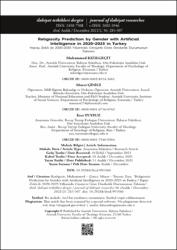| dc.contributor.author | Kızılgeçit, Muhammed | |
| dc.contributor.author | Çinici, Murat | |
| dc.contributor.author | Tuysuz, Esra | |
| dc.date.accessioned | 2022-09-08T07:12:10Z | |
| dc.date.available | 2022-09-08T07:12:10Z | |
| dc.date.issued | 2021 | en_US |
| dc.identifier.citation | Kızılgeçit, M. , Çinici, M. & Tuysuz, E. (2021). Religiosity Prediction by Gender with Artificial Intelligence in 2020-2025 in Turkey . İlahiyat Tetkikleri Dergisi , (56) , 283-307 . https://doi.org/10.29288/ilted.993560 | en_US |
| dc.identifier.issn | 2458-7508 | |
| dc.identifier.issn | 2602-3946 | |
| dc.identifier.uri | https://doi.org/10.29288/ilted.993560 | |
| dc.identifier.uri | https://hdl.handle.net/11436/6405 | |
| dc.description.abstract | Religiosity continues to be the subject of both qualitative and quantitative studies in many branches of science. In this context, the dimensions of religiosity and its relationship with other variables are discussed. The aim of this study is to predict the future status of religiosity in the context of gender, based on current religiosity data. As a method, Artificial Neural Networks (ANN) technique, which provides both a systematic review description and a prediction for the future, is based on. In the sample of Turkey, a total of 75 master's and doctoral theses which based on quantitative methods were scanned and made ready for processing. Religiosity scores were normalized and converted into a standard scoring system. MATLAB software was preferred to benefit from mathematical algorithms. In ANN, predictions were made for the future by using the Time Series Method. According to the results obtained from the research, the religiosity of male and female students decreased after a certain period of time. In addition, religiosity in male and female adults continues to increase in the general total. Accordingly, it can be stated that the religiosity of young people who receive high school and undergraduate education is affected by the environment and time they live in. In addition, it can be said that there is an increase in the level of religiosity as a result of both the lifestyles of adults and the socio-cultural situation in our country. | en_US |
| dc.language.iso | eng | en_US |
| dc.publisher | Atatürk Üniversitesi | en_US |
| dc.rights | info:eu-repo/semantics/openAccess | en_US |
| dc.subject | Psychology of religion | en_US |
| dc.subject | Religiosity | en_US |
| dc.subject | Turkey | en_US |
| dc.subject | Systematic review | en_US |
| dc.subject | Artificial neural networks | en_US |
| dc.title | Religiosity prediction by gender with artificial intelligence in 2020-2025 in Turkey | en_US |
| dc.type | article | en_US |
| dc.contributor.department | RTEÜ, İlahiyat Fakültesi, Felsefe ve Din Bilimleri Bölümü | en_US |
| dc.contributor.institutionauthor | Tuysuz, Esra | |
| dc.identifier.doi | 10.29288/ilted.993560 | en_US |
| dc.identifier.issue | 56 | en_US |
| dc.identifier.startpage | 283 | en_US |
| dc.identifier.endpage | 307 | en_US |
| dc.relation.journal | Journal of Ilahiyat Researches | en_US |
| dc.relation.publicationcategory | Makale - Uluslararası Hakemli Dergi - Kurum Öğretim Elemanı | en_US |


















